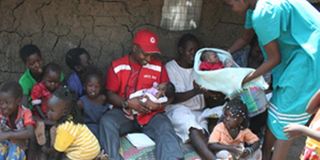What it means to give birth to twins in a refugee camp

The mother of the twins, Ms Hanan Elly, being given one of her babies at Rhino Camp Refugee Settlement in Arua District. PHOTO BY BY CLEMENT ALUMA
What you need to know:
An expectant refugee woman must overcome many risks to her health and survival on her journey to motherhood. One mother shares her plight after delivering twins.
My name is Hanan Elly and I am 32 years old. People say I look young but I am a mother of eight. I gave birth to these twins at Ocea Health Centre in Arua District recently.
I am from South Sudan, from the Nuba Mountains.
I did not know when exactly I was due. When the war started, I just fled without picking any property. Out of our six children then, I only managed to grab two; the rest ran to different directions.
Getting to the camp
We were many refugee expectant mothers who came to the health centre without antenatal documents, so the midwives had to start counselling and immunizing us and giving us medical examinations.
When I think about the way we escaped, it is only by God’s mercy that I am alive today. I walked for so many kilometres through the mountains and forests with one child on my back and the other in my hands, yet I was also heavy. There were bullets flying all over the place. It is God who protected us.
Labour pangs began at a reception centre at Ocea in Rhino Camp after we had arrived from Koboko District where we refugees were picked by UNHCR after entering Uganda.
The unexpected bundle
I didn’t even know that I was pregnant with twins. I was praying that I have a safe and normal delivery and that God it is what I had. Having complications would have made life very difficult for me.
I have not yet named the twins. Culturally, their father names them. If I do not get any information about the whereabouts of my husband from Red Cross which is working to re-unite families, I will name them. Life here is really strange, I do not know anyone here.
I do not have any relative; the only people I have here are my children but I can’t discuss anything with them because they are still young.
My husband, Mr Khunda Hisan, is an SPLM soldier and I am not sure whether he is alive or not. I do not know where he is or where our other children are since there are no phones to communicate with those who remained in South Sudan. My greatest worry is about integrating into the community yet I have no money or relatives.
I do not have a house or food. So I do not know how I am going to breastfeed these twins. There is no comfort of life with these children and it is only the midwife who has been helpful ever since I got here.
My heart has never been at peace because of my other children. Every now and then I pray to God that they and my husband are alive because my children need a father.
We had just settled after many years of war. Kiir and Machar are brothers; they should negotiate for peace so that we go back to our country. All we need from them is peace so that we can live as a family.
As told to Clement Aluma
About Ocea health centre
Ocea health centre provides new mothers with mama kits and mosquito nets, courtesy of the Ugandan government and the United Nations High Commission for Refugees.
Ms Joyce Kakiye, the midwife explains that they advise mothers to exclusively breastfeed their children for six months before introducing them to other foods.
But with lack of food to feed the mother to produce breast milk, refugee mothers are at risk of starvation though formula foods are provided by agencies.
The refugee desk officer at the office of the prime minister in Arua Mr John Arinaitwe says that such mothers are given special attention as they are vulnerable.
“We give special attention to all refugee mothers, not only those who have given birth to twins. We construct houses for them and are given both food and non-food items,” Arinaitwe said.
Unlike other refugee camps, where the refugees are crowded into camps and in tents, in these camps, every family is provided with a plot of land to build a house.
They are also provided with pieces of land for farming. The children go into the national schools, and with support from international humanitarian agencies, they are placed in villages called clusters.




